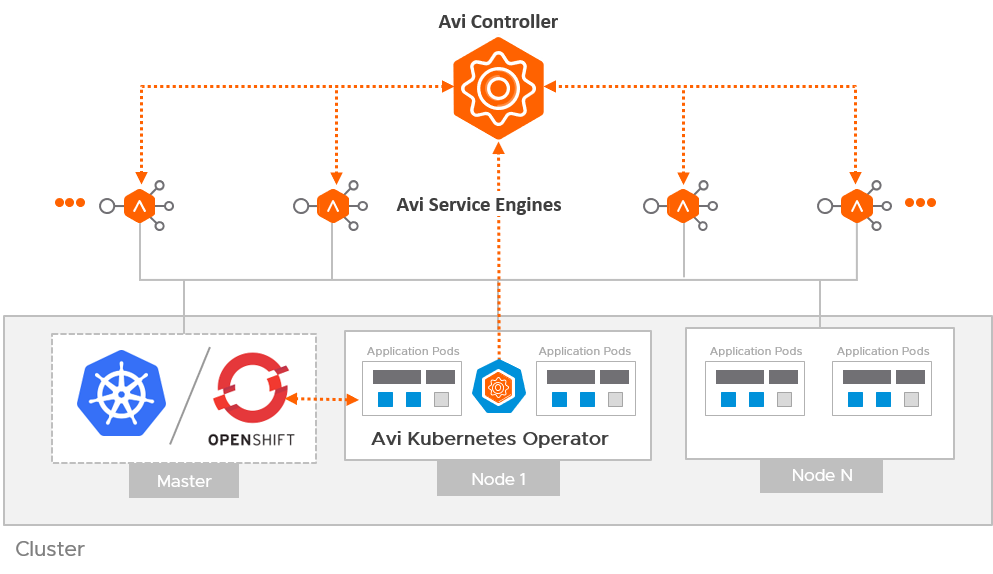Avi Kubernetes Operator Version 1.9 Release Notes
The Avi Vantage platform integration with OpenShift/ Kubernetes provides a redesigned architecture involving a new operator called Avi Kubernetes Operator (AKO). The following illustration outlines the components of the Avi Kubernetes integration.
Release Notes for AKO Version 1.9.3
What’s New in AKO Version 1.9.3
- Support for version Kubernetes 1.26
Issues Resolved in AKO Version 1.9.3
-
Static routes are not getting added for a new node where a node is deleted and then new node is added to the cluster.
-
If two clusters, with overlapping cluster name (i.e. one cluste rname is prefix of another cluster name) and deployed in
ClusterIPmode, are connected to the same controller, then reboot of AKO, present in a cluster with name which is the prefix of one cluster name, deletes static routes of the other cluster. -
During AKO boot up, if there is an error to list AKO CRD objects, AKO disables CRD handling. That results in deletion of existing avi controller objects.
Release Notes for AKO Version 1.9.2
What’s New in AKO Version 1.9.2
- The configuration flag
useDefaultSecretsOnlyto allow AKO to handle default secrets from the namespace where AKO is installed in OpenShift environment.
Issues Resolved in AKO Version 1.9.2
- AKO is publishing incorrect next hop.
- Patch to VRF Context is failing with the error message error : route_id has duplicate values.
Release Notes for AKO Version 1.9.1
What’s New in AKO Version 1.9.1
- Support for Kubernetes v1.25 and OpenShift Container Platform 4.11
- Support to deploy AKO in HA mode.
- Support for SCTP protocol on L4 virtual services.
- Support for IPV6 networking for Antrea and Calico CNI.
- Support for Shared VIP for NodePort and NodePortLocal service type in the AKO configuration.
- Boot-up time optimization.
Issues Resolved in AKO Version 1.9.1
- In nodeport deployment, pool servers are populated with IPV4 IP addresses even if IPFamily is set as V6.
- AKO is not cleaning up ISTIO resources even if ISTIO is disabled or
deleteConfigis set to true. - Virtual services are not getting updated if alternate cert is updated or deleted in
hostruleCRD.
Key Changes in AKO Version 1.9.1
- The Annotation ako.vmware.com/load-balancer-ip support to specify preferred IP for L4 services.
Known Issues in AKO Version 1.9.1
- When AKO is deployed in HA, 409 status code error messages will be seen in active AKO if failover happens during bulk object addition.
- When AKO is running in dedicated mode, the virtual service and VIP are not deleted from the NSX Advanced Load Balancer Controller when ingress/route, with
aviinfrasettingapplied to ingress/route, is deleted.
Document Revision History
| Date | Change Summary |
|---|---|
| February 02, 2023 | Published the Release Notes for AKO version 1.9.1 |

